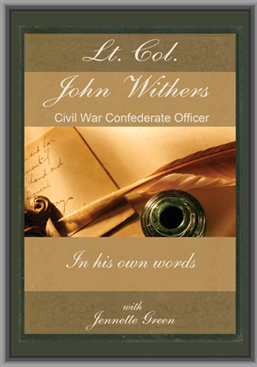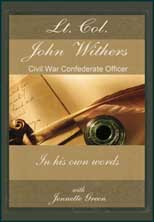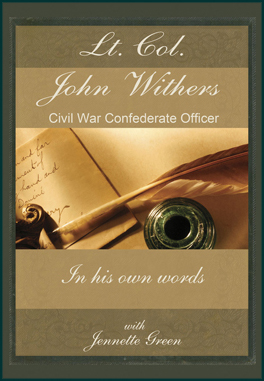|
Receive a free ebook! Newsletter |
Lt. Col. John Withers
Civil War Confederate Officer,
In His Own Words
An eyewitness account of the American Civil War, never before published in its entirety.
Told from the first person perspective of Lt. Col. John Withers, an Assistant Adjutant General in the James Buchanan administration, and later in the Jefferson Davis administration for the Confederacy, this Civil War diary encompasses over two years in Withers’ life, from October 1860 – December 1862.
Because of the nature of his job, Lt. Col. Withers was closely acquainted with many of the notable figures of Civil War history. His friend, Ed. A Palfrey, later wrote, “his relations with the President and Secretary of War were of an intimate character, as was necessarily the case from the position he held.”
Lt. Col. Withers’ family was from the south. When Withers received a letter from his aunt, Susanna Withers Clay (wife of Clement Comer Clay, 8th Governor of Alabama), urging him to resign his commission in the U.S. Army and come south to join the Confederate cause, Withers did so. He joined the Confederate Army in March, 1861.
While stationed in the Confederate capitol of Richmond, Virginia, Lt. Col. Withers recorded civil war events as they happened, including the Seven Days Battles, and other battles that took place during the early part of the “War Between the States.” He also wrote of the more personal aspects of his life, such as the agony of his wife’s illness and his young son’s death.
Withers wrote of the profound and the mundane, and even, on occasion, the slightly bizarre human behavior that he witnessed. His diary provides a unique, first person account of life during the American Civil War. His is a rich story, and worthy to be told.
(Handwritten diary images are available in the print edition only. (280 pages total in print, 135 pages in Kindle.))
Civil War Diary Introduction
Told from the first person perspective of Lt. Col. John Withers, an Assistant Adjutant General in the James Buchanan administration, and later in the Jefferson Davis administration for the Confederacy, this civil war diary encompasses over two years in Withers’ life, from October 1860 – December 1862.
Because of the nature of his job, Lt. Col. Withers was closely acquainted with many of the notable figures of the Civil War era. His friend, Ed. A. Palfrey, later wrote, “his relations with the President and Secretary of War were of an intimate character, as was necessarily the case from the position he held.”
While Withers served in Washington D.C. in 1860, he wrote of meeting with James Buchanan, and how he briefly met the Prince of Wales, Baron Renfrew (Edward Albert VII), who was only nineteen when he visited the United States in 1860, in the uneasy months before the start of the “War of the Rebellion.”
Notable figures with whom Withers was closely acquainted in the Confederacy included Jefferson Davis, his wife, Varina Davis, and the Secretary of War. In addition, he wrote of meeting with famous Confederate Generals Robert E. Lee, Joe E. Johnston, A.S. Johnston, and others. He casually alluded to other heads of state that he met as a matter of course in his position.
Withers’ family was from the south. His uncle, Clement Comer Clay, was the 8th Governor of Alabama, (and also in his lifetime, Chief Justice of Alabama, Congressman, and U. S. Senator). When Withers received a letter from his cousin, John Withers Clay, and his aunt, Susanna Withers Clay (Clement Clay’s wife), urging him to resign his commission in the U.S. Army and come south to join the Confederate cause, Withers did so. He joined the Confederate Army in March, 1861.
While stationed in the Confederate capitol of Richmond, Virginia, Lt. Col. Withers recorded civil war events as they happened, including the Seven Days Battles, and other battles that took place during the early part of the “War Between the States.” He also wrote of the more personal aspects of his life, such as the agony of his wife’s illness and his young son’s death.
Lt. Col. Withers’ journal provides a detailed Civil War timeline rich in facts and details of events, a few medical procedures and medicines used during this era, as well as plays and musical concerts that he and his wife attended.
Withers wrote of the profound and the mundane, and even the slightly bizarre, such as when he wrote of when multitudes of the ladies and gentlemen of Richmond went out to watch a battle rage on a summer night:
“The cannonading was terrific—that and the volleys of musketry, could distinctly be heard in Richmond. Hundreds of ladies and gentlemen went out to the Northern suberbs [sic] of the City to hear the firing. The bursting of shells, and the flash of the heavy guns could be distinguished very plainly after night fall.”
Lt. Col. John Withers’ diary provides a unique, first person account of life during the American Civil War. His is a rich story, and worthy to be told.
Order your own copy of Lt. Col. John Withers, Civil War Confederate Officer
Read Chapter One
October, 1860.
Monday, 1st. Anita, Edward and I, left Huntsville about 7, A.M., on our way to Washington: we traveled all day and night. Edward was pretty well during the day, but was not so at night.
Tuesday, 2nd. We again traveled all day and night, although our little boy had fever nearly the whole time.
Wednesday, 3rd. We reached Washington City about daylight, and put up at Brown’s Hotel. I reported at the Adjutant General’s Office after breakfast, and then went house hunting. The Prince of Wales, and Suite, arrived here at 5, P.M., and went to the President’s.
Thursday, 4th. In company with the other officers of the Army, as well as the Navy Officers, all in full dress Uniform, I went up to the President’s at 12, M., to-day, and paid my respects to Lord Renfrew: I bowed to him, and he to me, as I passed him. I shook hands with Mr. Buchanan and Secretary Floyd. The reception room was jammed with people. The Prince is a pleasant looking, amiable appearing young man, with a big nose. I had seen the Prince and suite pass down Pennsylvania Avenue earlier in the day, on his way to visit the capitol and other public buildings.
Friday, 5th. Baron Renfrew, the Prince of Wales, went to Mount Vernon with his suite to-day. Nothing special going on except the magnificent display of fire works near the President’s in the evening: Anita and I saw a portion of them.
Saturday, 6th. The Prince of Wales and suite left to-day for Richmond, Virginia. Anita and I both saw them as they passed down Pennsylvania Avenue.
Sunday, 7th. Anita and I attended St. Aloysius church to-day, and heard a splendid sermon by Father McGuire.
Sunday, 14th. During the past week I have been busy house hunting, and finally determined to take a furnished one, No. 261, “I” St., between 17th & 18th. We have been much worried all the week on account of Edward’s being indisposed—he is much better to-day. It is raining and quite cool, cold I might say, and we have fire in our room.
Monday, 15th. We moved from the Hotel to our rented house on I Street, between 17th and 18th to-day: we had no wood, coal or gas, but succeeded in getting the former two before night. We are very nicely fixed on the whole. I was down in the city a while in the earlier part of the afternoon, but remained at home at night. Pleasant weather.
Tuesday, 16th. Anita and I were engaged getting our groceries, and other little necessaries for house keeping. We have gas to-night. Our cook and chamber-maid answer our purposes very well. Pleasant day. Frost.
Wednesday, 17th. Our little son is better to-day—we took him out in the carriage with us as we went visiting: we made half a dozen calls. Fine weather. We are faily [sic] house keeping again. Mrs. Genl. Is. Johnston called to see Anita sociably late in the afternoon.
Thursday, 18th. Anita and I took Edward out visiting with us to-day, although he was quite sick last night—the ride in the open air seemed to do him good, but he got worse again late in the afternoon. The doctor came whilst the little fellow was suffering, and seemed to understand at once what was troubling him: he made a prescription for him which relieved his pain and put him to sleep. Mr. Calvert, the gentleman from whom I rented our house, spent the evening with us.
Friday, 19th. Cloudy and windy all day: rained hard at night. I wrote letters all the evening. Our little boy is very much better indeed. Nothing going on. Mrs. Dr. Wood called to see Anita to-day. The storm was very severe at night.
Saturday, 20th. Rainy, disagreeable day. I was at home most of the day and at night. Edward is very much better.
Sunday, 21st. Anita and I went to St. Matthews Church in the forenoon, and took the baby out riding after dinner. Fine day. We consider Edward well now. Dr. Wood called to-day.
Monday, 22nd. Pleasant day. I was duly installed at my desk in the Adjutant General’s Office to-day. Anita and I walked out in the afternoon, and I walked down the avenue after tea. Our baby is seven months old to-day: he was not well last night, and kept us up until about three O’Clock.
Tuesday, 23rd. I was at the Office until 3, P.M. Anita and I walked down the avenue after dinner, and I called to see Genl. Harney after tea. I found the General alone—he has rooms at a negro man’s named Wormley. We sat and talked for about two hours.
Wednesday, 24th. Anita walked down in the City before dinner, with Charlotte and the baby: I found her complaining of fatigue when I came from the Office, she ate only a little dinner, and then went to bed. I remained at home all the afternoon. Lt. and Mrs. A.P. Hill, and Capt. Williams called at night and sat an hour or so. After they left I went down for Dr. Edwards, who came up to see Anita—he gave her a dover powder to take, which nauseated her and made her vomit.
Thursday, 25th. Anita had violent headache and nausea this morning, and spit up a little blood in her efforts to vomit. I remained at home with her all day: she got some better by noon, and was much improved by night, but still kept her bed.
Friday, 26th. Anita was better in the morning, and continued to improve all day. I was at the office to-day, and called in the evening to see Mr. Bell, and to bid Maj. and Mrs. Nichols goodbye.
Saturday, 27th. Neither Col. Cooper, Maj. Townsend nor Capt. Williams were at the office to-day, so Capt. Garesché and I had it all to our own way. I took Anita and Edward out riding in the afternoon. Beautiful days and moonlight nights—the nights are not bright as we have them in Texas, there being much more moisture in the air here than there. Nothing very interesting going on.
Sunday, 28th. Anita and I walked to church at ten O’Clock, but we could not get a seat and returned home: in the afternoon we went down to the laying of the corner stone of the St. Aloisius Orphan’s Asylum, and heard a sermon by the Rev. Father McGuire. There were several thousand persons present. McLean and Ihrie came around in the evening: Dr. Smith, Dr. Foard, and A.P. Hill were around to see us during the day. Cloudy nearly all day, and strong indication of rain, but no rain fell.
Monday, 29th. I was at the Office from nine, A.M., until three, P.M. Anita, and Charlotte with Edward, walked down the avenue, and did not get back home until near four O’Clock. I called at Col. Craig’s and to see Capt. Williams, Dr. Foard and Capt. Alexander after dinner: we remained at home all the evening.
Tuesday, 30th. Rained last night, and a little this afternoon. Anita and I called at Dr. Wood’s and at Dr. Smith’s in the afternoon. I called to see Capt. and Mrs. McLean in the evening.
Wednesday, 31st. Rained hard last night and a little to-day. I walked around to see Mr. and Mrs. A.P. Hill after tea. Bell and Trowbridge called, the former in the afternoon, the latter at night. My pay, Col. T.P. Andrews, was $157.60, and my commutation, Capt. Morris Miller, was $43.00. Anita’s rents were $85. My transportation (Capt. Morris Miller), from San Antonio, Texas, to Washington City, D.C., for self and servant, was $252.05. Our income was, therefore, $537.65. Our expenses amounted to $517.24. Our income exceeded our expenses by $20.41.
End of Excerpt…


